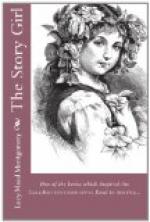There, to the right, is sweet Cecily of the dear, brown eyes, with a little bloated dictionary beside her—for you dream of so many things you can’t spell, or be expected to spell, when you are only eleven. Next to her sits Felicity, beautiful, and conscious that she is beautiful, with hair of spun sunshine, and sea-blue eyes, and all the roses of that vanished summer abloom in her cheeks.
Peter is beside her, of course, sprawled flat on his stomach among the grasses, one hand clutching his black curls, with his dream book on a small, round stone before him—for only so can Peter compose at all, and even then he finds it hard work. He can handle a hoe more deftly than a pencil, and his spelling, even with all his frequent appeals to Cecily, is a fearful and wonderful thing. As for punctuation, he never attempts it, beyond an occasion period, jotted down whenever he happens to think of it, whether in the right place or not. The Story Girl goes over his dreams after he has written them out, and puts in the commas and semicolons, and straightens out the sentences.
Felix sits on the right of the Story Girl, fat and stodgy, grimly in earnest even over dreams. He writes with his knees stuck up to form a writing-desk, and he always frowns fiercely the whole time.
Dan, like Peter, writes lying down flat, but with his back towards us; and he has a dismal habit of groaning aloud, writhing his whole body, and digging his toes into the grass, when he cannot turn a sentence to suit him.
Sara Ray is at his left. There is seldom anything to be said of Sara except to tell where she is. Like Tennyson’s Maud, in one respect at least, Sara is splendidly null.
Well, there we sit and write in our dream books, and Uncle Roger passes by and accuses us of being up to dev—to very bad mischief.
Each of us was very anxious to possess the most exciting record; but we were an honourable little crew, and I do not think anything was ever written down in those dream books which had not really been dreamed. We had expected that the Story Girl would eclipse us all in the matter of dreams; but, at least in the beginning, her dreams were no more remarkable than those of the rest of us. In dreamland we were all equal. Cecily, indeed, seemed to have the most decided talent for dramatic dreams. That meekest and mildest of girls was in the habit of dreaming truly terrible things. Almost every night battle, murder, or sudden death played some part in her visions. On the other hand, Dan, who was a somewhat truculent fellow, addicted to the perusal of lurid dime novels which he borrowed from the other boys in school, dreamed dreams of such a peaceful and pastoral character that he was quite disgusted with the resulting tame pages of his dream book.
But if the Story Girl could not dream anything more wonderful than the rest of us, she scored when it came to the telling. To hear her tell a dream was as good—or as bad—as dreaming it yourself.




